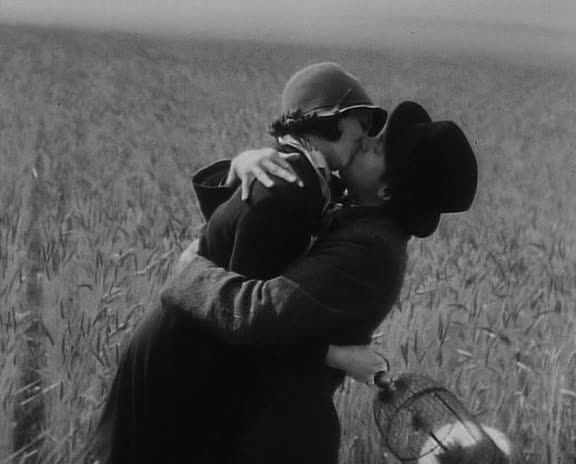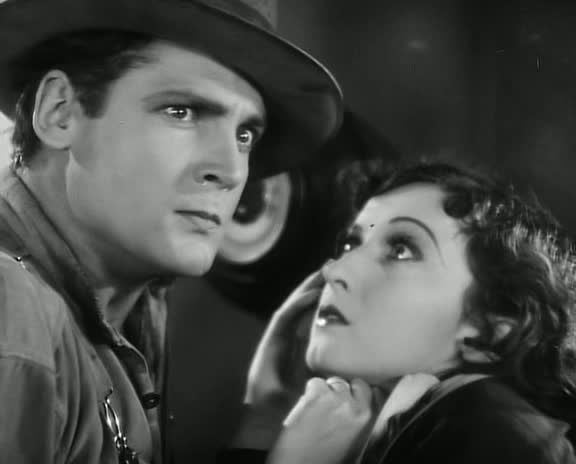
F.W. Murnau's City Girl is something of a response to and a reconfiguration of the director's earlier Sunrise, returning to that film's theme of the opposition of rural and urban values. Lem (Charles Farrell) is a farmer's son, heading to the big city to make a deal for his family's impending wheat harvest. While he's there, he isn't able to make quite the deal that his stern father (David Torrence) had been counting on, but he does meet the waitress Kate (Mary Duncan), so when he returns to the family farm, it's with a girl from the big city as his new wife. Naturally, this sets up a country/city divide, but not in the expected ways, and Murnau purposefully hints at his earlier film as a way of contrasting it against this one. At the beginning of the film, while Lem is taking the train to the city, he's sized up by a gold-digging woman who takes interest once she notices the wad of bills he's carrying. She's a callback to the vile city vamp of Sunrise, but Murnau swiftly foils her plans; thankfully, this isn't a story about the city girl corrupting the wholesome and innocent country boy, but something much more complex.
In fact, this is a film about love transcending that kind of shallow distinction between city and country. It's also about replacing romantic and artificial notions about rural purity and urban corruption with a more pragmatic and balanced view of humanity as a whole. Kate herself, unhappy in the city, romanticizes the country, looking longingly at posters of a wheat field and a pond with a couple rowing across it — an image that's not nearly as romantic as it seems to her, with Sunrise's iconic and rather grim boat ride in mind. Murnau sets the film up as though it is going to be steeped in romantic pastoralism, in shallow contrasts between city and country. "Give us this day our daily bread," the farmer says as he prepares to eat, and Murnau cuts from him slicing off a large slice of bread from a loaf to a diner in the city, where tiny slices of processed white bread roll off a conveyer belt for a waitress to serve. Lem is also something of a caricatured rural good boy, which is partly what attracts Kate to him in the first place. In a crowded, fast-paced urban restaurant where most of the guys just want to leer at her, Lem stands out as the guy who prays before he eats and writes out postcards expressing his love for his kindly mother (Edith Yorke).
It's when the couple arrives in the country that the trouble starts, though not quite immediately. Their arrival at Lem's family farm is exuberant and kinetic, Murnau's camera tracking along with the couple as they run and twirl through the fields of wheat, pausing to hold and kiss one another, excited and in love. The farmhouse in the distance, its chimney billowing smoke, promises the welcoming comfort of home and hearth. The reality, of course, is not quite as idyllic: Lem's father, with his own received ideas about the differences between city and country, views this woman as an interloper, a bad girl, a vamp who's just using his son in some way.

Once she moves to the country, Kate soon learns that it's not what she thought it would be, and that there's cruelty and nastiness everywhere, that there are even men here just as mean and manipulative as her grabby diner customers, like the harvest foreman Mac (Richard Alexander), who tries to exploit the tension between her and Lem to break them apart. Kate had gone to the country thinking that she'd be escaping the urban grind and the soul-numbing artificiality of the city. In her cramped city apartment, billboards had provided her only window into natural vistas, and she tried to approximate the allure of the natural world with a wind-up mechanical bird kept in a cage, a toy that she then brings with her to the country, where it in turn provides a connection back to the city.
Murnau, even while critiquing simplistic dichotomies between city and country, still captures the moody beauty of the countryside, the lure of the open fields, the sensuous gloom of a dark night with a pale moon hanging low in the sky above the farmhouse. The film's gorgeous imagery is especially mesmerizing during the stunning, incredibly tense climax, in which the family and their hired hands must rush to bring in the harvest before a threatening hailstorm blows in and destroys the crops. While the wind kicks into a frenzy and the men labor outside, the brewing trouble between Lem and Kate comes to a head as Mac stirs up a confrontation with Lem's father. The stormy, foreboding atmosphere constantly threatens to explode in various ways, and the tension builds with the increasingly intense wind outside. Murnau's images are loaded with drama, particularly in the way in which he frames taut two-shots in which the characters' poses are infused with their conflicted emotions. The images of Kate and Lem together, especially, are charged with their new, passionate, but fractured relationship — their postures simultaneously suggest intimacy and disconnection, as though they're both desperately pushing towards each other and pulling away, their intimacy polluted by the differences in their backgrounds and origins.
This is one of Murnau's very best films, a deeply moving and passionate film, a poignant romance that's tested but ultimately strengthened by the film's clearheaded skewering of the idealization that often goes along with such romances.

1 comment:
Magnificent framing of a film that is surely one of Murnau's masterpieces, one that is finally getting the respect that has eluded it in past decades because of what was seen as an unfavorable comparison with the towering SUNRISE. You examine it's thematic and artistic intricacies with rightful relish, and vouch for it's timelessness.
The Masters-of-Cinema blu ray is quite the godsend.
Post a Comment